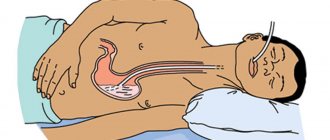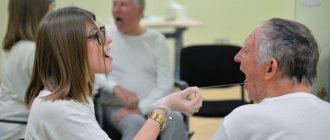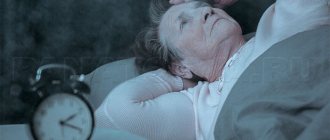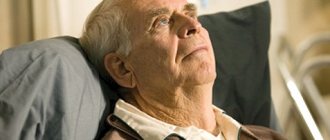Senile dementia in men - a common occurrence after 60 years. It is important to notice the first signs of how your loved one is changing. The sooner you consult a doctor with complaints, the faster the diagnosis will be made and the more effective the treatment will be. Honey offers modern methods of therapy that will help stop the process and improve the quality of life of patients.
What is dementia in older men and its causes
Dementia (dementia) is a disease characterized by a set of symptoms that appear as a result of pathological processes in the tissues of the brain. A person experiences memory deterioration, thinking disorders, and loss of habitual skills to such an extent that they complicate everyday life and normal work. The older a person is, the higher the risk of getting sick.
The cause of the disease can be:
- natural aging processes;
- pathologies of the thyroid gland;
- vascular disorders (ischemia, hypertension, atherosclerosis, etc.);
- neurological disorders (stroke, head injury);
- intoxication with alcohol or drugs;
- chronic poisoning with toxic substances;
- a brain tumor.
As can be seen from the reasons, dementia can be age-related and early - developing in young and middle age.
Causes of the appearance and development of age-related diseases
The aging process is a slowdown in metabolism, a decrease in immunity, and a weakening of the functions of various organs and tissues at the cellular level. When degenerative changes in the body reach a critical level, a little stress is enough for the onset or sudden development of any disease.
The popular thesis “all diseases come from nerves” has a serious basis, but many other factors can provoke any illness:
- Passive, sedentary lifestyle, excess weight;
- Improper (irregular, unbalanced) nutrition;
- Bad habits: alcohol and tobacco abuse;
- Harmful environmental influences, poor ecology;
- Psychological trauma, stress, lack of positive communication, loneliness;
- Physical injuries, wounds, surgical interventions;
- Uncontrolled use of medications, self-medication;
- Past infectious diseases and poisonings;
- Genetic predisposition...
As a result, difficult living conditions or simply an unfortunate combination of circumstances significantly increase the risk of developing pathologies in old age.
How it starts, main signs
The first signs appear after 60 years. There is an interesting feature - the risk of dementia doubles every 5 years. Among the elderly after 70 years, the proportion of patients is about 25%, after 80 years - every second one. It is important to pay attention to the early signs of dementia. After all, they are noticeable 5-10 years before the appearance of clear symptoms of the disease itself! If you learn to notice them, you can help your loved one in time.
Be sure to consult with your doctors if your loved one:
- O - forgets the day of the week, buy food, where he left his glasses.
- Has great difficulty remembering new information.
- Old, “dear to the heart” memories are easily recalled, but what happened yesterday is forgotten.
- Complains of absent-mindedness and fatigue.
- Speech becomes impoverished, forgets simple everyday words.
- Does not understand jokes and proverbs without prompting.
- Likes to tell the same stories and ask the same questions without delving into the interlocutor’s answer.
- He gets lost in a familiar place and doesn’t find his way home.
- Has a violation of planning and sound criticism: dresses inappropriately for the weather, goes outside in a dressing gown.
- Confused about money and unable to count change correctly in a store.
- Forgets to eat.
- He neglects changing clothes and wears the same clothes day after day.
- Laughter gives way to tears (weakness).
- Notices physical weakness due to forgetting to eat and not feeling thirsty.
Over time, a loss of interest occurs, and as a protective reaction of the body, there is a fear of everything new. 30% of sufferers experience mild symptoms of depression (insomnia, decreased or decreased appetite, anxiety). This allows you to suspect “something is wrong.” Further manifestations of depression become more severe. The person does not believe in the success of the treatment, is sad, often cries from the hopelessness of the situation, grief, and does not understand what is happening to him. At first, he denies all symptoms and explains them by “external circumstances.” It is important to know that with this combination of symptoms there is a high risk of suicide attempts.
Digestive system diseases
The gastrointestinal tract and auxiliary organs of the digestive system process food, absorb nutrients and water into the blood, form and remove undigested food debris. Like all human organs, the digestive system is subject to age-related degradation, which leads to insufficient nutrition of the entire body.
Often older people complain of problems associated with digestive disorders:
- flatulence (bloating),
- constipation or diarrhea,
- indigestion,
- stomach ulcer,
- pancreatitis,
- cholelithiasis,
- chronic colitis,
- haemorrhoids…
In the absence of timely treatment and prevention, digestive disorders can cause exacerbation of diseases of other organs.
In some cases, to eliminate such problems, in addition to drug treatment, it is necessary to resort to surgical interventions.
In a specialized boarding house for the elderly, it is much easier to establish constant medical monitoring and proper diet and nutrition that help block the development of diseases of the digestive system.
Kinds
Dementia acts as an independent disease or accompanies others. There are several varieties:
- Alzheimer's disease. This is the most common form of dementia in men over 60 years of age. It is characterized by increasing forgetfulness of current affairs with retention of memory for ancient events. For a long time, the only symptom observed is forgetfulness.
- The vascular form is the second most common. Risk factors include smoking, male gender, high cholesterol. Such patients suffer from high blood pressure, coronary heart disease and diabetes. They often have a history of strokes, heart attacks, and changes in the retina of the eyes. Memory impairment is not as severe as in Alzheimer's disease. The onset of the disease is acute.
- Mixed form. It is more malignant - vascular disorders worsen the course of Alzheimer's disease.
Medical control, prevention of age-related diseases
The task of our boarding house staff is to create favorable living conditions for guests that reduce the likelihood of developing age-related diseases:
- Correct daily routine, healthy lifestyle, abstinence from using tobacco and alcohol;
- Dosed physical activity, depending on the patient’s condition;
- A balanced diet (reducing the intake of salt, cholesterol, fatty acids and carbohydrates);
- Control, weight loss in older people with signs of obesity;
- Regular monitoring of patient health: blood pressure, blood sugar and hemoglobin levels;
- Positive moral climate, friendly atmosphere in the team, patience, winmania and constant care from the staff.
In addition, strictly as prescribed by the attending physicians, additional antihypertensive, lipid-lowering and antithrombotic therapy is carried out using antithrombotic drugs and anticoagulants...
The life of an elderly person in a specialized boarding house implies not only rehabilitation after various diseases and injuries, but also the creation of favorable conditions for the prevention and prevention of new diseases, prolongation of active longevity...
Stages
This disease has several stages:
- The first is the most inconspicuous and, perhaps, the most insidious. It practically doesn't show up at all. If you are attentive to a man, you will notice that a person close to you begins to forget some things, behaves unusually, and sometimes cannot complete a simple assignment.
- The second is perhaps even heavier than the third. Precisely for relatives caring for them. The patient no longer remembers loved ones, does not always recognize himself in the mirror, leaves the apartment on his own or completely refuses to leave it. Periodically forgets where the toilet is in the apartment, how to brush his teeth, take a shower, and becomes more irritable. He ceases to be interested in books, cinema, television, theater, and concerts. Possible weight loss.
- The third stage is the last. As a rule, the patient stops getting out of bed, loses his appetite, and requires constant care.
Senile dementia: what is it?
As we age, various types of malfunctions begin to occur in the human body more and more often, which affect its condition. Sometimes these can be mental disorders - both emotional and cognitive. It is important to note that senile dementia primarily refers specifically to cognitive disorders (although this disease inevitably affects the emotional state of an elderly person, and also leads to the appearance of behavioral abnormalities of the psyche). As a result, the patient experiences a decrease in general emotionality and the development of a depressive state (although there seems to be no reason for this).
It is important to understand that this disease is typical only for older people. Its development can affect a person’s ability to speak and think, and also affects perseverance and memory. At the same time, the quality of life of a patient with dementia sharply decreases, because already in the initial stages the symptoms of the disease can be quite strong.
A person suffering from senile dementia gradually begins to forget about the skills he has ever learned. At the same time, he is not able to acquire new practical skills at all (or such learning occurs with serious difficulties). As a result, the elderly person is not only unable to continue to engage in his professional activity or favorite activity, but over time begins to need care and control from his immediate family.
It is worth noting that senile dementia comes in several degrees of severity, namely:
1. Mild degree. In this case, there is a disruption in social activities and a decrease in the performance of the elderly person. He begins to lose his professional skills and abilities, and also ceases to have interest in various hobbies. Despite this, the patient can take care of himself, while observing the rules of personal hygiene and orienting himself in space.
2. Moderate degree. With this form of the disease, an elderly person develops a partial loss of orientation in space, he begins to lose many vital skills (for example, those related to the use of simple household appliances). In this case, leaving an elderly person alone is quite risky, since often he is not able to cope with basic tasks, for example, opening or locking the front door.
3. Severe degree. This degree of development of the disease is characterized by the appearance of serious disturbances in a person’s daily activities and personality degradation. Therefore, the patient needs constant supervision, as he is unable to perform even the simplest tasks of self-care. In addition, he may not understand what others are telling him, and he himself may not show any interest in close people (manifestations of aggression are also possible).
Dementia in men - how to help your husband or loved one
What to do if your husband has dementia? As a rule, wives notice the first signs. Because in old age, the children have long since moved away, but the spouse remains nearby.
Suspecting something was wrong:
- Contact the Leto clinic. Our specialists will assess the patient’s condition and develop the most effective tactics for further action.
- Go to your appointment already prepared - with examinations performed (MRI of the brain or X-ray of cerebral vessels).
- Decide to live together. At least starting from the second stage of the disease, this cannot be avoided.
- Closely monitor your medication intake. This will delay the onset of the next stage of the disease as much as possible.
- At least once every two years, be sure to visit the specialist you contacted to correct your treatment. This disease progresses, and the doses of the devices taken need to be increased.
- Don’t forget to give your man some easy tasks: sweep the floor, wash the dishes, dress or undress yourself, wash your face, brush your teeth. Sing old songs with him, turn on your favorite music, do some modeling or putting together puzzles.
- At all stages, provide emotional support and encouragement.
- Be prepared for the upcoming changes in life.
- Do not allow the use of a personal car, recommend public transport, take care of a personal driver.
- Come together or bring your husband to special support groups.
- Maintain hydration and remind your spouse about water.
- Monitor his overall physical health.
- Learn more about community support resources.
- If you have difficulties with simple household chores, explain slowly and show how to do it.
- Leave things in their original places.
- Read one book, watch a movie, and then discuss.
- If necessary, put reminders on sticky notes in capital letters.
- You're kidding! Humor prolongs and improves life.
How you can help your doctor
For diagnosis, it is very important to know what happened and what happened. Stories from loved ones and colleagues will help with this. After all, it is necessary to understand whether a person had a rich vocabulary or not. There are very subtle differences between dementia and normal aging changes.
Before your visit, try to remember and write down some points related to your husband’s dementia.
- What prevents you from living with a person with dementia and what does he complain about?
- Note significant events that have occurred recently (retirement, children's weddings, birth of grandchildren, loss of loved ones).
- Make a list of all the medications the patient takes (medicines, vitamins, food supplements).
- Have you ever had dementia in your family?
- Previous operations, recent illnesses (take all the necessary papers).
- When the symptoms appeared, were they constant, what brought relief?
The most common diseases of aging
According to the Ministry of Health of the Russian Federation, along with life expectancy, the number of diseases among older people in Russia is growing. 30 - 40 years ago, old age was associated with joint problems, deterioration of vision and hearing; in the 21st century, diseases associated with the circulatory and digestive systems took first place.
Today, almost every fourth Russian of retirement age (women over 55, men over 60) suffers from high blood pressure and hypertension, which in turn provoke many other diseases.
Every fifth pensioner has been diagnosed with lesions of bones and musculoskeletal tissues. Respiratory diseases are also common among older people.
Considering the trend of increasing life expectancy and statistics of medical examinations of older people, the number of detected cancers, lesions of the cardiovascular system and gastrointestinal tract is also growing. At the same time, many old people end up in social boarding houses with a whole bunch of various diseases.
In general terms, the anti-rating of age-related diseases looks like this:
- Hypertension
- Heart failure
- Arthritis
- Stroke
- Osteoporosis
- Diabetes
- Asthma
- Stomach ulcer
- Oncological diseases (cancer)
- Dementia
- Multiple sclerosis
- Parkinson's disease
Morbidity statistics for older people in the capital and large cities naturally differ from the indicators collected by the Ministry of Health in different regions of Russia. As part of the national “Health” project, our country has recently begun to calculate the healthy life expectancy , which has long been accepted in developed countries of the world, but what is the use of these statistics for our pensioners..?
Proper care and recovery
An elderly person can cope with any illness more easily if there is good care and attention from loved ones.
Cost of services
| CONSULTATIONS OF SPECIALISTS | |
| Initial consultation with a psychiatrist (60 min.) | 6,000 rub. |
| Repeated consultation | 5,000 rub. |
| Consultation with a psychiatrist-narcologist (60 min.) | 5,000 rub. |
| Consultation with a psychologist | 3,500 rub. |
| Consultation with Gromova E.V. (50 minutes) | 12,000 rub. |
| PSYCHOTHERAPY | |
| Psychotherapy (session) | 7,000 rub. |
| Psychotherapy (5 sessions) | 30,000 rub. |
| Psychotherapy (10 sessions) | 60,000 rub. |
| Group psychotherapy (3-7 people) | 3,500 rub. |
| Psychotherapy session with E.V. Gromova (50 minutes) | 12,000 rub. |
| TREATMENT IN A HOSPITAL | |
| Ward for 4 persons | 10,000 rub./day |
| Ward for 3 persons | 13,000 rub./day |
| Ward 1 bed VIP | 23,000 rub./day |
| Individual post | 5,000 rub. |
| PETE | 15,000 rub./day |
This list does not contain all prices for services provided by our clinic. The full price list can be found on the “Prices” , or by calling: 8(969)060-93-93. Initial consultation is FREE!
Treatment of dementia in men at the Leto clinic
As a rule, with age-related dementia you have to deal with several diseases, so the treatment plan is selected strictly individually. The therapeutic regimen takes into account measures aimed at treating the underlying disease and normalizing blood pressure. Particular emphasis is placed on improving cerebral circulation. With the development of psychotic disorders, antidepressants, antipsychotics, and anticonvulsants are indicated.
You need to understand that prescribed drugs only slow down the development of the disease. In most cases, a man with dementia will no longer go to work and will never be the same as he was before. But he will be able to take care of himself independently, he will understand where he is and who is next to him. This will change your life too. The sooner you start taking the medications, the faster the effect will be visible. Even at the advanced second stage, you can achieve good results only over a longer period. Much attention is paid to psychotherapy and training in nursing skills.
Are you facing dementia in older or middle-aged men? Just dial 8(969)060-93-93 . We provide assistance both in the hospital and at home.
Diseases of the cardiovascular system
Various cardiovascular pathologies, often found in older people, are difficult to diagnose in the early stages.
Cardiac ischemia develops without acute symptoms. Old people begin to be bothered by shortness of breath and slight tingling in the chest.
Cerebral ischemia , caused by reduced blood supply to the brain, is accompanied by insomnia, increased irritability, absent-mindedness and low performance.
Myocardial infarction is accompanied by painful sensations in the lower abdomen, shoulders, neck, and changes in heart rate. Sometimes it feels like a stroke. Diagnosed by a blood test, where the ESR is elevated and leukocytosis is detected.
Arterial hypertension is often diagnosed at pre-retirement age and is fraught with hypertensive crises. Symptoms of this disease are unsteady gait, weakness, frequent headaches with tinnitus. If the disease progresses to a severe form of hypertension , the threat to the life of an elderly person becomes very real.
Heart failure is often caused by sclerotic changes in the heart muscle or blood vessels. The main symptoms: general malaise, fatigue, blurred vision, and musculoskeletal disorders. Without proper therapy, further development of the disease can lead to decreased mental activity (dementia).










